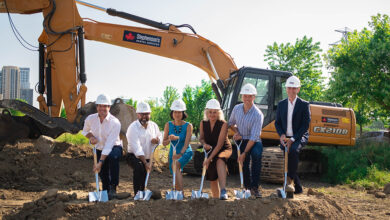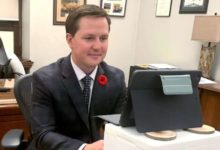Senior’s problems are everyone’s problems

During Covid-19 pandemic seniors have been one of the most vulnerable groups in society. Not only because of their medical conditions and health vulnerability, which make the virus an even bigger threat to them, but also because of their mental health. Social isolation can be cruel for those who are already living alone, or in long-term care homes or other facilities, and experiencing loneliness. Rates of depression and anxiety drastically increased between these groups. Besides that, some of these places are no longer considered safe for the elderly. In Ontario, there are currently 134 active outbreaks of the virus at long-term care homes and the numbers of deaths are increasing day by day. To discuss this situation, and what the government is doing to try to improve it, Manuel DaCosta interviewed Raymond Cho, MPP for Scarborough-North and the Minister for Seniors and Accessibility in Ontario, for the TV show Here’s the Thing (Camões TV).
Manuel DaCosta: You immigrated from South Korea in 1967 and you worked very hard: had three jobs to pay for education and to establish yourself in Canada. Why did you choose Canada to immigrate?
Raymond Cho: Thank you for having me, and that’s a big question. Toronto is an special city, the best city in the world, the city of diversity, where everybody is welcomed. I didn’t choose Canada, but in fact my young brother, I’m going back more than half a century, got discharged from Korean navy and he asked me to arrange a meeting with the Canadian Immigration Officer, because back in that time I was working with the American Embassy in South Korea. So, I arranged the interview, and after the interview, the Canadian Immigration Officer said that I spoke English very well, and should apply to go to Canada, because I’d be able to get a good job over there. In the beginning I was in disbelief, but that was what I did. Me and my brother sent our applications to Hong Kong, where there was an Immigration Office Station, and two months later we got the answer. For some reason my young brother was not accepted, but I was. So I decided to come. It was 1967, I landed in Vancouver, B.C, and at that time, to be honest, I was thinking about coming to Canada, stay five or 10 years, and return to Korea, my home country. The first job I got was as a dishwasher, and I said: “I didn’t come to Canada to wash dishes”. I put in my mind that I was going to study, become a millionaire, and would get my PhD, become a doctor and then go back to Korea. That was my original plan. I went to Edmonton, Alberta, where I got three jobs, I made money to pay the tuition fee for my MBA program in UBC and I also become a Christian. I started my life as a dishwasher, and today, I’m talking to you as a Minister. So, Canada is definitely the land of opportunity.
MDC: Do you think that as immigrants we have reached the point where the Canadian Society has recognized a certain equality, where ethnic immigration is representative of what Canadian Society is today?
RC: There are still some systematic discrimination, but overall, compared to other countries in the world, this is the best country. It’s the land of opportunity. For everybody that works hard, there is always an opportunity. Take my example. I’m not bragging, I’m lucky to be a Minister and to be doing a good work. I also have a lot of support from Premier Doug Ford, whom I consider a great leader. For example, in the Minister Cabinet Meetings, I don’t feel any discrimination, it’s an honest feeling. I fell a strong support, and in this difficult time, the Premier leadership is outstanding and the Cabinet is working as a team, and that is why compared to other jurisdictions or provinces, except Newfoundland and Labrador, I think Ontario is doing very well, because we have a very good and dedicated team. So, you know, I repeat to everybody, this is the land of opportunity, you work hard and don’t know what tomorrow will bring to you. It pays off.
MDC: In many ways, this pandemic has brought out leadership qualities in people, that sometimes they didn’t even know they had, but they come out and come forward to lead this country and this province in ways that weren’t apparent before. These challenges can bring out the best in all of us. Do you think your government is performing at the level it should be to confront this pandemic?
RC: Definitely, I think so. As you said, leadership shines in difficult times. Before Covid-19, the media was attacking Premier Doug Ford from all sides, it’s normal. But the Premier works so hard with the Deputy Premier Christine Elliott, and all the cabinet team, all the MPPs, so now people appreciate the Premier. He’s a man that works 24 hours a day, seven days of the week, I don’t know how he does that. I’m working very hard, but the Premier is working harder and because of that, the results speak for themselves. We’re doing good, overall, but I also feel very sad and sorry because so many people lost their lives – I share my deep sympathy for families who have lost loved ones. Everywhere I go, I say “thank you so much” to frontline workers, whether they are doctors, nurses, or PSW, they risk their lives to help the most vulnerable people and it’s not only about leaders, it’s about regular people, and as the Premier said “We have 14.5 million team players, Ontario is great.” And if government and the people work together, we can be tougher than Covid-19, and we’re going to win this battle.
MDC: As Minister of Seniors and Accessibility you took on a very tough portfolio, because seniors always seem to be on top of mind, those who are in long-term care facilities and particularly those who are at home: they can’t go out; anxiety and depression can be a reality, particularly to seniors. What is the government, specifically you, doing to help seniors is these regards?
RC: Seniors are the most vulnerable and as we know social isolation is the number one enemy for seniors, and in order to protect their well-being, the government is encouraging them to self isolate, but also doing programs to improve their life quality. We’re investing 16 million dollars in Ontario community support programs, to provide food, medicine and the essential services for seniors in need. We’re also investing 9 million dollars, annually, to help seniors to get dental care, and at least 100.00 seniors will get quality free dental care. On top of that, we’re investing 25 million dollars for infrastructure for the dental care. Also, we’re providing ways to connect seniors that are isolated over the Ontario 211 phone program: they can call and get access to information about the services the government provides, and it’s available in 150 different languages, so everybody can be understood. We provided 2 million dollars to improve the accessibility in communities, in the program called “Inclusive Community Grants”. To help the ones who are living in retirement homes, we’re providing 30.9 million dollars in personal protective equipment and in infection prevention control program. There’s also the Seniors Renovation Tax Credit, for accessibility, which is a fully refundable tax credit for the 2021 tax year worth 25% of up to $10,000 in eligible expenses to make homes “safer and more accessible.”
MDC: On the topic of isolation and helping seniors, how important are friends and family in the support of these seniors that in many cases live alone, or just with a partner, and can’t get out. How important is the continuous connectivity between them?
RC: Government can only do so much. Senior’s problems are everyone’s problems. Everybody is going to become a senior. I encourage everyone that knows a senior living in the community, to go visit them, call them, do some shopping for them. I’m giving you an example. I’m a senior myself, I’m 84 years old, and my sister, she is 94 years old, she lives in a nursing home in South Korea, and I call her twice a day. I call in the beginning of day, call in the end of the day, to ask about her day, tell her good night and I’m sure she’s grateful for that. Everybody can do that, call your grandparents, help seniors. When you help other people it’s a blessing for you.
MDC: How do you see the improvement in the treatment of senior in long term care homes?
RC: The provincial government is working so hard for poor and vulnerable people, we have an independent commission to investigate spread of the virus within long-term care homes, how residents, staff and families were impacted, and the adequacy of measures taken by the province and other parties to prevent, isolate and contain the spread. Also, the seniors in long- term care homes are going to be prioritize in Covid-19 vaccination.
MDC: Are you planning in running for next election?
RC: Definitely, I’m going to run, and I love my riding (Scarborough-North), there’s mutual respect between us. When politician work hard and in an honestly way, they keep getting elected. That’s why I got elected eight times as Toronto City Councillor and elected as a MPP twice. It’s a calling, it’s only once in a lifetime, you don’t always have this kind of opportunity.
MDC: You’re involved in organizations to help other people. How did you get into that?
RC: I’m lucky, I had a great mom. She never went to school, but she was a very kind and generous person. I guess I got these gene from her, the social gene, of loving people. It doesn’t matter the nationality, the religion, I care for people, this is Canada value. I keep repeating: we live in the best country. Canada is the country of diversity and volunteer people, always willing to help each other.
Transcrição: Lizandra Ongaratto/MS








Redes Sociais - Comentários